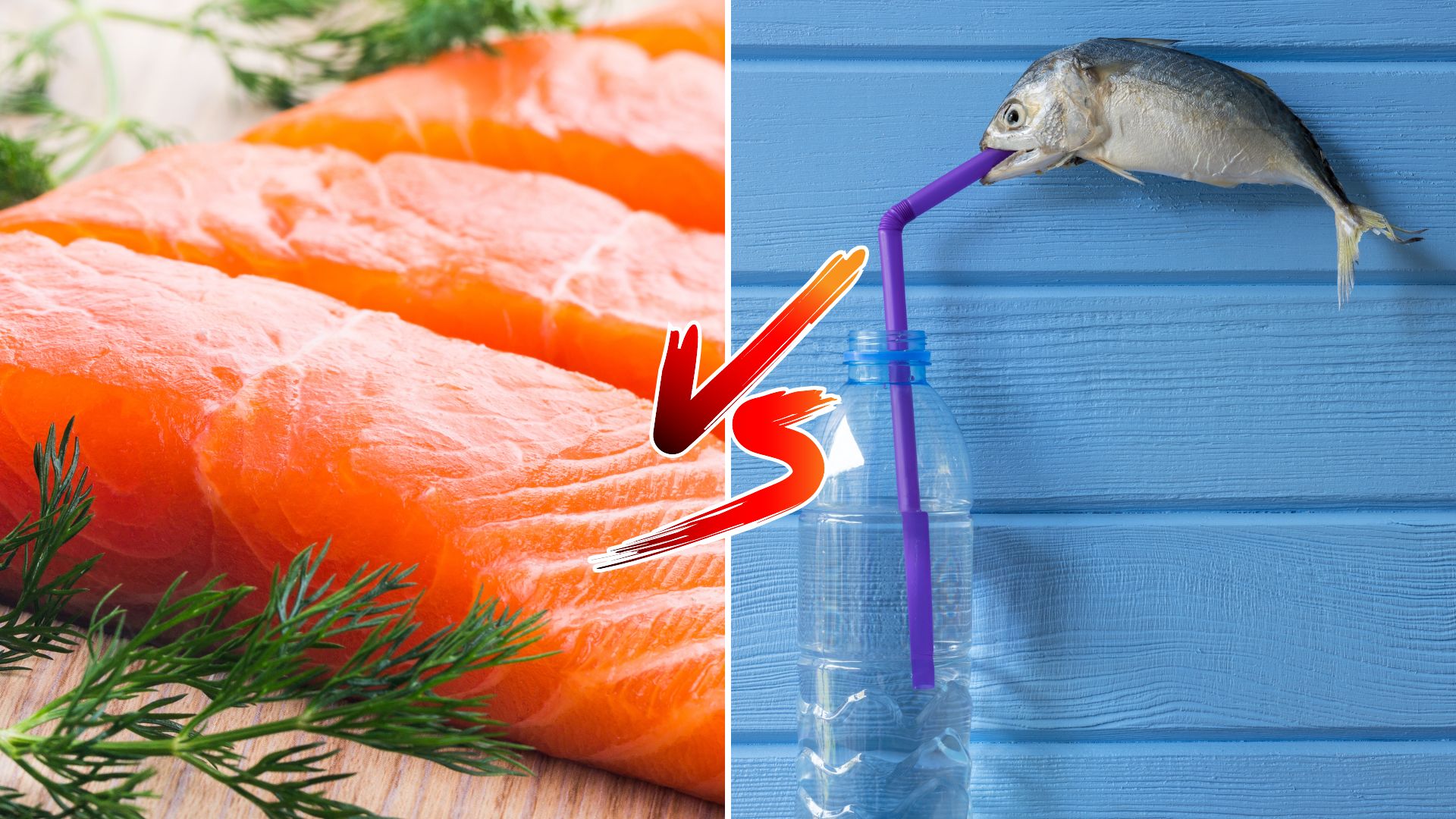Fish has gained significant recognition as a valuable component of a healthy diet due to its exceptional nutritional value. Packed with essential nutrients, fish offers a range of health benefits that contribute to overall well-being.
In this article, we will delve into the comparison between two popular fish varieties: mackerel and salmon. Through an exploration of their nutritional profiles, we aim to determine which fish prevails in the Mackerel vs Salmon debate.
Mackerel and salmon have emerged as top choices among health-conscious individuals, and fish consumption have soared in popularity due to its reputation as a lean source of protein. Moreover, fish is renowned for its abundance of omega-3 fatty acids, which are vital.
This article aims to provide an in-depth comparison of the nutritional profiles of mackerel and salmon. Additionally, we will explore the potential health benefits associated with consuming mackerel and salmon.
We will investigate the impact of their omega-3 fatty acids on heart health, inflammation reduction, and overall well-being. Furthermore, we will explore additional benefits such as improved brain function, vision support, bone health, and skin health. So mackerel vs salmon..? Let’s get into it!
Health Benefits of Mackerel

Mackerel is a fatty fish that offers a wide array of health benefits, making it an excellent choice to incorporate into a balanced diet. Let’s delve into the potential advantages that mackerel consumption can provide:
- Impact on Heart Health: Mackerel is known for its high content of omega-3 fatty acids, particularly eicosapentaenoic acid (EPA) and docosahexaenoic acid (DHA). These fatty acids have been extensively studied for their positive effects on cardiovascular health. Research suggests that omega-3 fatty acids can reduce the risk of heart disease by lowering triglyceride levels, reducing blood pressure, and preventing the formation of blood clots. They also contribute to maintaining a healthy heart rhythm, which is crucial in preventing cardiac arrhythmias.
- Anti-inflammatory Properties: Inflammation is a natural immune response, but chronic inflammation can lead to various health issues, including heart disease, arthritis, and certain cancers. Mackerel’s omega-3 fatty acids possess potent anti-inflammatory properties that can help combat chronic inflammation. By reducing the production of pro-inflammatory substances in the body, mackerel may aid in alleviating symptoms associated with conditions such as rheumatoid arthritis and inflammatory bowel disease.
- Brain Health and Cognitive Function: Omega-3 fatty acids, particularly DHA, are critical for brain health and cognitive function. They play a vital role in the development and maintenance of the brain, especially during fetal development and early childhood. Studies have shown that omega-3 fatty acids can improve cognitive performance, memory, and attention in both children and adults. Consuming mackerel may contribute to brain health, potentially reducing the risk of neurodegenerative disorders such as Alzheimer’s disease.
- Vision Support: Mackerel’s omega-3 fatty acids also play a crucial role in maintaining good eye health. DHA, in particular, is a structural component of the retina, the light-sensitive part of the eye. Adequate intake of omega-3 fatty acids has been associated with a reduced risk of age-related macular degeneration (AMD), a leading cause of vision loss in older adults. Regular consumption of mackerel may help support healthy vision and protect against AMD and other eye conditions.
- Nutrient-Rich Profile: Besides omega-3 fatty acids, mackerel is packed with essential nutrients. It is an excellent source of high-quality protein essential for muscle growth, repair, and overall body function. Mackerel is also rich in vitamin D, which plays a crucial role in bone health, immune function, and mood regulation. Additionally, it provides significant amounts of vitamin B12, selenium, and niacin, all of which are important for various physiological processes in the body.
In conclusion, consuming mackerel offers numerous potential health benefits. Its rich omega-3 fatty acid content contributes to heart health, anti-inflammatory effects, brain function, and vision support.
Additionally, mackerel provides a host of essential nutrients that promote overall well-being. Including mackerel in your diet can be a flavorful and nutritious way to support a healthy lifestyle.
Potential Disadvantages of Mackerel

Mackerel vs salmon? While mackerel is a nutritious fish with various health benefits, it is important to be aware of the potential disadvantages associated with its consumption. Here are a few factors to consider:
- Mercury Content: Mackerel, especially the larger ones, can gather mercury in their bodies over time. Mercury is a heavy metal that can be harmful to human health when consumed in high amounts. It is primarily present in the aquatic environment through industrial pollution and can enter the food chain. High levels of mercury in the body can have adverse effects on the nervous system, particularly in developing fetuses and young children. To minimize exposure to mercury, it is advisable to choose smaller species of mackerel and limit consumption to recommended guidelines.
- Environmental Concerns: The sustainability of mackerel fishing is a matter of concern. Overfishing, where fish are caught at a rate faster than their ability to reproduce, can lead to the depletion of mackerel populations and disrupt marine ecosystems. It is important to be mindful of the source of mackerel and choose fish that have been responsibly and sustainably harvested. Look for certifications or labels such as the Marine Stewardship Council (MSC) that ensure the fish is sourced from well-managed fisheries.
- Allergenic Potential: Like other fish, Mackerel can be allergenic for some individuals. Fish allergies are relatively common and can cause adverse reactions ranging from mild symptoms like hives and itching to severe allergic reactions, including anaphylaxis. If you have a known fish allergy or suspect an allergic reaction to mackerel, it is crucial to avoid its consumption and seek medical advice.
- High-Fat Content: While the high-fat content of mackerel is one of its nutritional advantages, it may not be suitable for everyone. Individuals with certain medical conditions, such as pancreatitis or gallbladder disease, may need to moderate their intake of fatty foods, including mackerel. Additionally, individuals who are following a low-fat diet or trying to manage their calorie intake should be mindful of the higher fat content in mackerel compared to leaner fish varieties.
It is important to note that the potential disadvantages mentioned here should be considered in balance with the overall benefits of mackerel consumption. Incorporating mackerel into a well-rounded and varied diet while being mindful of the potential concerns can help individuals make informed decisions about their seafood choices.
Health Benefits of Salmon

Salmon is widely recognized for its exceptional health benefits, thanks to its rich nutritional profile. Let’s explore the advantages of including salmon in your diet:
- Omega-3 Fatty Acids and Heart Health: Salmon is packed with omega-3 fatty acids, particularly EPA and DHA. These essential fatty acids have been extensively studied for their positive impact on heart health. Research suggests that consuming omega-3 fatty acids can help lower blood pressure, reduce triglyceride levels, and prevent the formation of blood clots. These benefits contribute to a reduced risk of heart disease and stroke, making salmon a valuable addition to a heart-healthy diet.
- Anti-Inflammatory Properties: Salmon possesses potent anti-inflammatory properties, mainly due to its omega-3 fatty acid content. Chronic inflammation is linked to various health issues, including cardiovascular disease, arthritis, and certain cancers. The omega-3 fatty acids found in salmon help reduce inflammation in the body, thereby potentially alleviating symptoms associated with inflammatory conditions. Regular consumption of salmon may contribute to overall inflammation reduction and improved health.
- Bone Health: Salmon is an excellent source of vitamin D, a nutrient crucial for maintaining strong and healthy bones. Vitamin D aids in the absorption and utilization of calcium, an essential mineral for bone formation and density. Adequate intake of vitamin D and calcium contributes to optimal bone health and can help reduce the risk of conditions such as osteoporosis.
- Skin Health: The omega-3 fatty acids in salmon play a vital role in maintaining healthy skin. They help moisturize the skin, reduce inflammation, and support overall health. Salmon is also rich in antioxidants, such as astaxanthin, which can help protect the skin from sun damage and promote a youthful appearance.
Incorporating salmon into your diet provides a wide range of health benefits, including heart health support, inflammation reduction, bone health promotion, and improved skin health. Its rich omega-3 fatty acid content, along with other essential nutrients, makes it a valuable addition to a well-rounded and nutritious eating plan.
Potential Disadvantages of Salmon

Salmon is generally considered a nutritious and healthy food choice. However, there are a few potential disadvantages associated with salmon consumption that are important to be aware of:
- Environmental Contaminants: Some types of salmon, particularly those sourced from certain regions or farms, may be exposed to environmental contaminants such as PCBs (polychlorinated biphenyls) and dioxins. These contaminants can accumulate in the fatty tissues of fish and may pose health risks if consumed in large quantities over time. To minimize exposure to environmental contaminants, it is recommended to choose wild-caught salmon from reputable sources or opt for sustainably farmed salmon that follows strict quality control measures.
- Allergenic Potential: Salmon, like other fish, can be allergenic for some individuals. Fish allergies are relatively common and can cause allergic reactions ranging from mild symptoms such as hives and itching to more severe reactions like difficulty breathing or anaphylaxis. If you have a known fish allergy or suspect an allergic reaction to salmon, it is crucial to avoid its consumption and seek medical advice.
- Environmental Impact of Farming: Salmon farming, also known as aquaculture, can have environmental implications. In some cases, overcrowded fish farms can lead to water pollution and the spread of diseases among fish populations. Additionally, farmed salmon may require the use of antibiotics and pesticides to manage potential disease outbreaks. Sustainable and responsible salmon farming practices, such as those certified by organizations like the Aquaculture Stewardship Council (ASC), aim to mitigate these environmental concerns.
- Potential for Heavy Metal Contamination: While salmon generally has lower mercury levels than larger predatory fish, it is not entirely exempt from the risk of heavy metal contamination. Salmon’s position in the aquatic food chain means it may contain trace amounts of mercury and other heavy metals. However, the levels are typically within the safe limits recommended by health authorities, and the overall health benefits of consuming salmon usually outweigh the potential risks.
It is important to note that the potential disadvantages mentioned here are typically associated with specific circumstances or individual sensitivities. For the majority of people, the benefits of consuming salmon as part of a balanced diet outweigh any potential drawbacks. However, it is always advisable to choose high-quality sources, be mindful of potential allergens, and consider the overall environmental impact of salmon production when making dietary choices.
Conclusion

So mackerel vs salmon? Both mackerel and salmon offer exceptional health benefits and are valuable additions to a nutritious diet. Fish, in general, has gained recognition for its rich nutritional value, providing essential nutrients and omega-3 fatty acids that contribute to overall well-being.
Mackerel stands out for its high omega-3 fatty acid content, which promotes heart health, reduces inflammation, and supports brain function and vision. It is also a nutrient-rich fish, offering high-quality protein, vitamin D, selenium, and niacin, among others. However, it’s important to be aware of the potential drawbacks of mackerel, such as its tendency to accumulate mercury and the need to choose sustainable sources to minimize environmental impact.
Salmon, on the other hand, is renowned for its omega-3 fatty acids, which promote heart health, reduce inflammation, and support bone and skin health. It is also a good source of vitamin D, crucial for bone health, and contains antioxidants that benefit the skin. While salmon is generally considered a healthy choice, it’s essential to be mindful of potential environmental contaminants and choose sustainable options.
Ultimately, the choice between mackerel and salmon depends on individual preferences, dietary needs, and considerations. Both fish offer an array of health benefits, and incorporating either or both into a balanced diet can contribute to a healthier lifestyle. It is recommended to vary fish consumption, choose high-quality sources, and be mindful of any specific health concerns or dietary restrictions.
By understanding the nutritional profiles, potential benefits, and disadvantages of mackerel and salmon, individuals can make informed decisions about which fish to include in their diets. Whether it’s the bold flavor of mackerel or the delicate taste of salmon, both fish offer a delicious and nutritious way to enhance overall health and well-being.
So today, we have hopefully answered the question: Mackeral vs Salmon for you!
